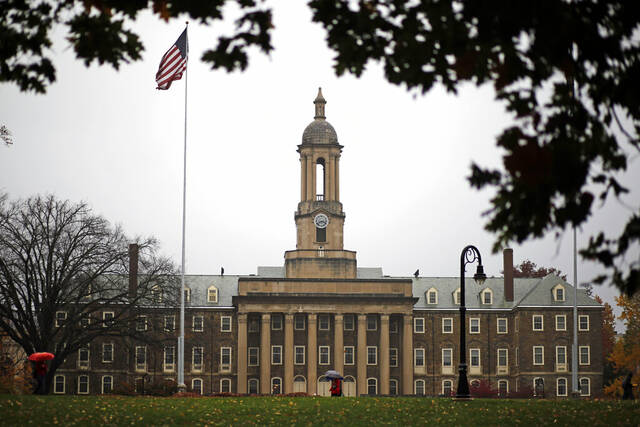Greater transparency requirements could be in store for Pennsylvania’s four state-related universities.
State Rep. Ryan Warner, a Republican from the 52nd District — which includes parts of Westmoreland and Fayette counties — has introduced legislation that would increase public access to the records of the University of Pittsburgh and Penn State, Temple and Lincoln universities.
Under the state Right-to-Know Law, state-related universities need to report only limited information about their finances every year.
Meanwhile, universities in the state system are subject to the same laws as government agencies, giving the public access to financial records and internal workings. Schools in the Pennsylvania State System of Higher Education in Western Pennsylvania include California, Indiana and Edinboro universities.
Warner said Pennsylvania and Delaware are the only states that allow their state-related universities to be so tight-lipped — but he hopes to change this.
“My opinion is, if you’re a public university, you should be subject to the same laws that any other college or university in this commonwealth is,” Warner said. “I don’t think there should be any closed books.”
‘A thorny problem’
When lawmakers fleshed out the details of the Right-to-Know Law in the mid-2000s, the state-related universities lobbied “very hard” to be exempt from some of the law’s requirements, said Melissa Melewsky, media law counsel for the PA NewsMedia Association.
Because these universities are not state-owned, they argued they should not fall under the same law as their PASSHE counterparts. Melewsky said state-related universities are different from an “organizational and funding perspective.”
“However, they do get a significant — and I mean significant — amount of public funding, and that demands a certain amount of accountability,” she said.
The state’s 2021-22 budget allotted a combined $566 million in general support funding to Pitt, Penn State, Temple and Lincoln.
Ultimately, the Right-to-Know Law, which was passed in 2008, requires the state-related universities to file annual reports on IRS form 990 information, salaries of all officers and directors, and their top 25 employee salaries.
These universities also are required to report financial information such as expenditures, faculty activity and median and mean salaries of employees.
Warner said these requirements lack the “openness” that is necessary when taxpayer dollars are involved. His bill would treat these schools like government agencies, with record access exceptions for research and development information, identity of donors, unpublished materials and information on examinations and testing.
Melewsky said there are two perspectives on why the lack of public access negatively impacts public policy and transparency.
From a financial perspective, Pennsylvanians don’t truly know how these universities are spending public funds, she said.
Additionally, the public lacks an understanding of how these universities operate.
For example, if a state-owned university has an academic integrity issue, the public could access records about this dispute. The same cannot be said for the state-related universities, which earned a 2017 nomination for “most secretive public agency or official in the U.S.” by the international organization Investigative Reporters and Editors.
“It’s a thorny problem,” Melewsky said. “People want to understand how these universities are operating and how they’re spending tens of millions of dollars of public money.”
In Melewsky’s opinion, a lack of public access means a lack of accountability. She added that limited access also can “breed misinformation” because people “assume the worst” when details aren’t provided.
“(Public access) helps clear up confusion and paints an accurate picture of what’s actually happening,” she said.
This isn’t the first time lawmakers have challenged state-related universities’ Right-to-Know stance. Melewsky said several similar pieces of legislation have been proposed to no avail.
Warner hopes to bring this bill to the state House of Representatives for a vote by November.
Pitt, Penn State response
During 2022 budget meetings, Warner posed a question about his proposed legislation to the leaders of the four universities.
Former Penn State President Eric Barron, who retired at the beginning of May, said there is “good and bad” to public access laws. Barron drew from his experience as former president of Florida State University, which was subject to a “very strong” public access law.
Barron pointed to several downsides of the law. He said the media publicized university presidential searches, thereby limiting the pool of candidates. Additionally, he said public access to faculty salaries meant that other schools used this information as a “recruiting tool” by offering more money.
“That’s not an effective use of resources because then I have to turn around and offer them (salary increases),” Barron said. “It just costs the students more.”
Barron added that in his four years as Florida State’s president, he never received a request for financial records.
The Penn State leader highlighted the importance of “working together” with the Legislature. Pitt Chancellor Patrick Gallagher echoed this during his remarks, adding that Pitt will work to provide “legitimate needs.”
“There has to be a certain degree of transparency and accountability in the public sector,” Gallagher said. “I thought we had been quite good at working with the Legislature.”
In a statement, Pitt Assistant Vice Chancellor of Communications David Seldin said the university “looks forward to engaging with lawmakers on this topic further as the legislative process continues.”
Penn State said it will “continue to work” with the General Assembly to promote accountability.
“We appreciate the tailored and principled approach that was taken to make our institutions fully accountable for the taxpayer resources that are invested in them,” spokeswoman Lisa Powers said in a statement.








